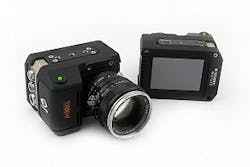High-speed digital cameras from Vision Research operate at up to 100k frames/s
The Phantom Miro eX1, eX2, and eX4 handheld, digital, high-speed cameras offer resolutions of 640 × 480 or 800 × 600 with rates of 500 to >1200 frames/s, and >100,000 frames/s at reduced resolution. Exposure times down to 2 ms allow users to freeze fast-moving objects and eliminate blur from video.
Vision Research
Wayne, NJ
www.visionresearch.com
------
PRESS RELEASE
Portability and Versatility Come Together in Vision Research’s New Phantom Miro eX-Series of Digital High-Speed Cameras
Phantom Miro eX-Series Offers Advanced Digital High-Speed Video Technology in Ultra-Compact, DSLR-Like Package
WAYNE, N.J. – In 2007, Vision Research, a leading manufacturer of high-speed digital imaging systems, revolutionized the way professionals across a variety of industries utilized high-speed video with the introduction of the Phantom Miro, a true point-and-shoot digital high-speed camera. The Phantom Miro’s unprecedented DSLR-like form factor opened the door to high-speed video for countless applications, offering a fully-portable, hand-held solution for the effortless recording of high-quality, digital video completely untethered from a power source. Building on the success of the Phantom Miro, Vision Research today unveiled the Phantom Miro eX-Series, the company’s next generation of hand-held digital high-speed cameras.
Taking the original Phantom Miro to the next level, the new Phantom Miro eX puts even more power and versatility in the palm of users’ hands thanks to an exciting new range of advanced features and functionalities. Available in three models, the Miro eX1, Miro eX2 and Miro eX4, these new compact digital high-speed cameras leverage over 50 years of Vision Research’s legendary high-speed video capture expertise to set a new standard for versatility in the industry.
The new Phantom Miro eX offers users a custom-designed CMOS sensor and is available in resolutions of 640x480 (Miro eX1, Miro eX2) and 800x600 (Miro eX4). With the Phantom Miro eX, users can take advantage of maximum, full-resolution frame rates of 500 frames-per-second (fps) to over 1,200 fps. By reducing resolution, the Miro eX can record even faster, reaching speeds of over 100,000 fps. The Phantom Miro eX also offers super-fast exposure times as low as two microseconds (1/500,000 second), allowing users to freeze fast-moving objects and eliminate blur from their video. The custom-designed CMOS sensors each feature impressive light sensitivity, with ISO-12232 ratings of 4800 for monochrome and 1200 for color, ensuring that the cameras will perform in the most challenging of lighting environments.
The new Phantom Miro eX has also been reengineered to be lighter and more ergonomic than its predecessor. The Miro eX features a conductive fiber filled polycarbonate body, which reduces the camera’s overall weight to 1.5 pounds (without the lens). Vision Research also redesigned the grip to allow the camera to be more comfortable in the hand, thereby reducing any fatigue from ongoing use.
All controls are accessed directly through the Phantom Miro eX’s advanced 3.5 inch touch-screen LCD, eliminating the need for a computer. The large LCD screen also allows users to review and edit their high-speed videos directly on the camera. Through the LCD, users can play and rewind, trim with in- and out-points as well as manage multi-cine setups and Vision Research’s new Image-Based Auto-Trigger feature.
When dealing with fast-moving objects, knowing when to trigger your digital high-speed camera is key, and the new Phantom Miro eX makes this easier than ever. The Phantom Miro eX is the first digital high-speed camera in Vision Research’s history to feature a built-in, Image-Based Auto-Trigger. This built-in triggering system allows users to program the Phantom Miro eX to automatically begin recording as soon as motion is detected within a specific point in the frame (available on Miro eX2 and Miro eX4).
The LCD interface now supports advanced multi-cine control, too. This allows a user to allocate the camera memory to 1, 2, 3 or 4 independent slow motion movies (cines). Having partitioned memory enables the user to record multiple cines back-to-back and then review, trim, save and delete any stored cine arbitrarily.
The Phantom Miro eX also is battery powered, allowing the digital high-speed camera to be used untethered from a power source. This gives users freedom of range, allowing them to take the camera into environments where it was never before possible to record. Fully mobile, users can simply carry additional batteries for longer shoots, replacing them on-the-fly as needed. The Miro eX is also compatible with any one-inch C-mount lens, and using an F-mount adapter, the camera can also utilize standard 35mm lenses.
The Phantom Miro eX will be available with options of 1GB, 2GB or 4GB of internal memory (1GB only on Miro eX1) and is also compatible with non-volatile, removable CompactFlash memory for the safe and easy storage of high-speed footage. The Phantom Miro eX1 model is priced less than $10,000 and is available for online ordering only at www.visionresearch.com/store. Additional information and detailed specifications for the Vision Research Phantom Miro eX Family of digital high-speed cameras can be found at www.visionresearch.com
About Vision Research
Vision Research designs and manufactures high-speed digital imaging systems used in applications including defense, automotive, engineering, science, medical research, industrial manufacturing and packaging, sports and entertainment, and digital cinematography for television and movie production.
The Wayne, N.J.-based company prides itself on the sensitivity, high-resolution and image quality produced by its systems, robust software interfaces, and reliability and versatility of its camera family – all which continue to stand as benchmarks for the high-speed digital imaging industry.
Vision Research digital high-speed cameras add a new dimension to the sense of sight, allowing the user to see details of an event when it’s too fast to see, and too important not to. For additional information regarding Vision Research, please visit www.visionresearch.com.
Vision Research is a business unit of the Materials Analysis Division of AMETEK Inc., a leading global manufacturer of electronic instruments and electromechanical devices.
